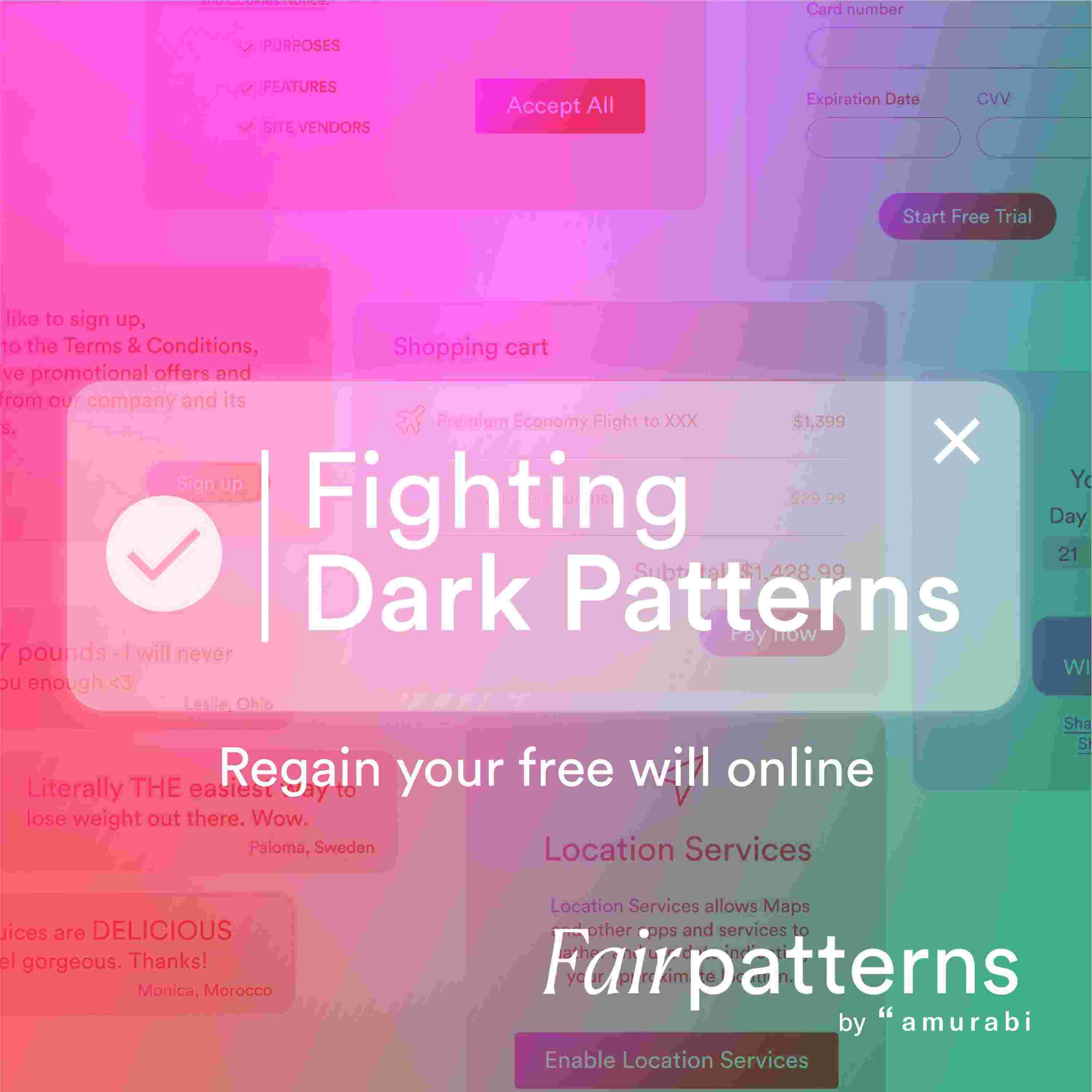
Have you ever struggled to resist sites or apps which prompt you to share ever more personal data? Who hasn’t casually clicked on the big green “I agree” button, instead of the little grey links below? And who doesn’t lose their patience unsubscribing from a website, when all it took was one click to “try for free”?
These features are called “dark patterns” or “deceptive patterns”, which are interfaces that deceive or manipulate users to make them act without realizing or against their own interests.
Why should we care about it ? Because …
✅ dark patterns harm the autonomy, the welfare and the privacy of individuals, and are psychologically detrimental
✅ a number of laws already prohibit dark patterns, and the global legislative framework is shifting towards clarity, transparency, accessibility and fairness by design
✅ dark patterns affect competition and trust in brands, and even puts our democratic models at risk
And because eventually, there is nothing sustainable about tricking users.
Dark patterns are pretty much everywhere online and yet, it’s not inevitable to be deceived or manipulated. With this podcast, once a month, Marie Potel, founder of the legal design agency Amurabi and of the platform fairpattern.com explore with her guests all the aspects of this dark and broad matter : regulation, ethics, marketing, user experience and much more.
A question or a need for support ? Go on fairpatterns.com or contact Marie Potel on LinkedIn !
This podcast is proposed and presented by Marie Potel, produced by Amicus Radio and directed by Leobardo Arango.
Original Music : Alexis Mallet.
Hébergé par Acast. Visitez acast.com/privacy pour plus d'informations.
Have you ever struggled to resist sites or apps which prompt you to share ever more personal data? Who hasn’t casually clicked on the big green “I agree” button, instead of the little grey links below? And who doesn’t lose their patience unsubscribing from a website, when all it took was one click to “try for free”?
These features are called “dark patterns” or “deceptive patterns”, which are interfaces that deceive or manipulate users to make them act without realizing or against their own interests.
Why should we care about it ? Because …
✅ dark patterns harm the autonomy, the welfare and the privacy of individuals, and are psychologically detrimental
✅ a number of laws already prohibit dark patterns, and the global legislative framework is shifting towards clarity, transparency, accessibility and fairness by design
✅ dark patterns affect competition and trust in brands, and even puts our democratic models at risk
And because eventually, there is nothing sustainable about tricking users.
Dark patterns are pretty much everywhere online and yet, it’s not inevitable to be deceived or manipulated. With this podcast, once a month, Marie Potel, founder of the legal design agency Amurabi and of the platform fairpattern.com explore with her guests all the aspects of this dark and broad matter : regulation, ethics, marketing, user experience and much more.
A question or a need for support ? Go on fairpatterns.com or contact Marie Potel on LinkedIn !
This podcast is proposed and presented by Marie Potel, produced by Amicus Radio and directed by Leobardo Arango.
Original Music : Alexis Mallet.
Hébergé par Acast. Visitez acast.com/privacy pour plus d'informations.

Did you know that …
✅ 97 % of e-commerce websites in the EU contain at least one dark pattern
✅ dark patterns increase the heart rate of users and raise anxiety
✅ kids are more vulnerable to dark patterns, as the part of the brain that helps us control our impulses fully matures at 25 years of age
In this very first episode, Marie Potel and her guest, Celia Hodent, psychologist specialized in UX games, independent consultant as a game UX strategist, and founder of GDC UX summit talk about the detrimental impacts of dark patterns on user experience and why companies should care about it in a long run strategy. They discuss the cognitive biases at play with dark patterns, the regulation applicable, the harms caused to individuals and to our economic model, and the incentives to switch from dark to fair patterns.
To go further :
👉 “What UX is really about : introducing a mindset for great experiences”, by Celia Hodent
👉 OECD digital economy papers “Dark commercial patterns”, oct. 2022, n°336
A question or a need for support? Go on fairpatterns.com or contact Marie Potel on LinkedIn!
Hébergé par Acast. Visitez acast.com/privacy pour plus d'informations.